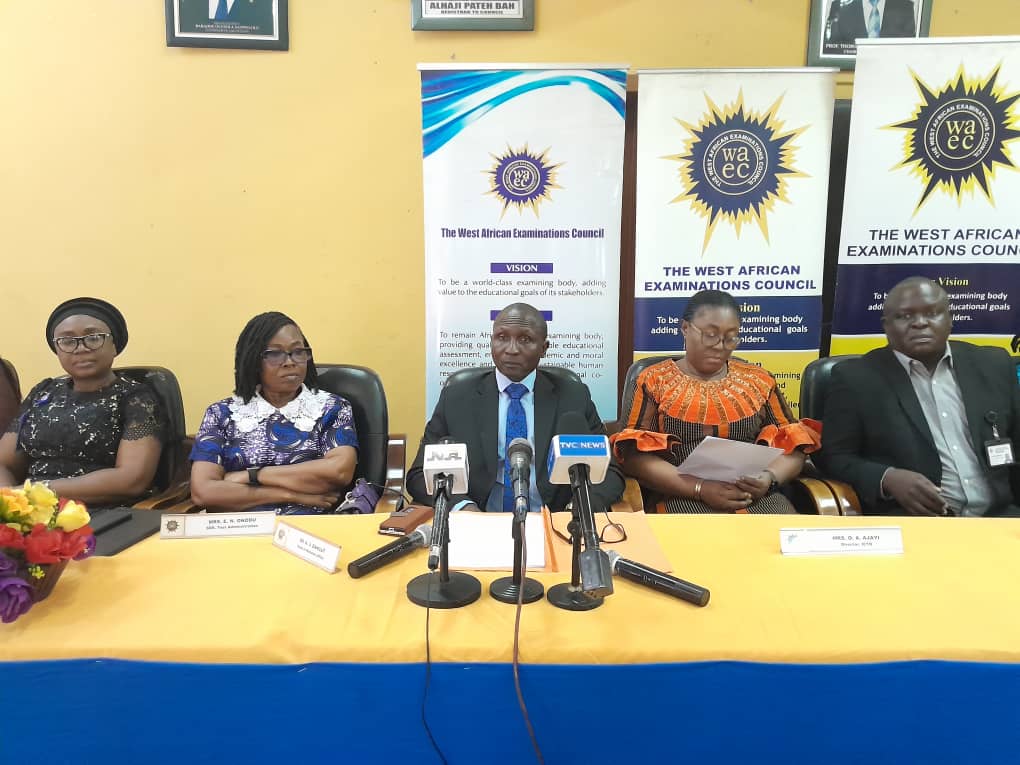


t a press conference on Friday at the council’s national office in Yaba, Lagos, the Head of WAEC Nigeria, Dr. Amos Dangut, acknowledged a major error in the marking of serialised papers, which resulted in a distorted reflection of candidates’ performance.
“With deep regret and on behalf of the Registrar to Council, as well as the Management and Staff of WAEC Nigeria, I apologise for the discrepancies identified in the grading of serialised papers.
“This is a difficult admission for us, but we must concede that it is deeply embarrassing,” Dangut stated.
He explained that the council had introduced a new security measure called paper serialisation, which is already being used by another national examination body.
However, during the post-examination review, it was found that the English Language Objective Test (Paper 3) was marked with incorrect answer keys because a wrong serialised code file had been assigned.
The other subjects affected by serialisation were Mathematics, Biology, and Economics.
“We found that an incorrect serialised code file was used during the printing of the English Language Objective paper,” Dangut said.
“This caused the scripts to be marked with the wrong answer keys. It’s important to stress that candidates who took the computer-based version of the exam were not affected.”
Following the correction, 1,794,821 candidates — representing 91.14 per cent — achieved credits or higher in at least five subjects (with or without English and Mathematics).
Among them, 1,239,884 candidates, or 62.96 per cent, earned five credits including English and Mathematics — a significant jump from the earlier reported 38.32 per cent.
Of this group, 657,819 (53.05 per cent) were female, while 582,065 (46.95 per cent) were male.
However, this still marks a 9.16 per cent decline from the 72.12 per cent recorded in 2024.
In total, 1,969,313 candidates took the examination, including those from schools in Benin Republic, Côte d’Ivoire, and Equatorial Guinea that follow the Nigerian curriculum.
The council also accommodated 12,178 candidates with special needs, including 112 who were visually impaired, 615 with hearing impairments, 37 who were physically challenged, and 52 with spastic or mental challenges. Their results have likewise been processed and released.
“All these candidates were given full support during the conduct of the examination,” Dangut stated.
Out of the total, 1,763,470 candidates (89.55 per cent) have had their results completely processed, while 205,916 (10.45 per cent) still have one or more subjects pending due to technical issues.
WAEC assured the public that work is ongoing to finalise processing and release the remaining results soon.
In the meantime, results for 191,053 candidates (9.7 per cent) have been withheld over suspected examination malpractice — a decrease from the 11.92 per cent reported in 2024.
Investigations are underway, and affected candidates may lodge complaints at waecinternational.org/complaints.
“WAEC will continue to enforce strict penalties for all cases of examination malpractice. Everyone must work together to cleanse the system,” Dangut stressed.
The council urged candidates to check their results through the official portal www.waecdirect.org and apply for their digital certificates, which will be available within 48 hours of result verification. Hard copy certificates will be issued within 90 days.
Dangut also reminded the public that candidates sponsored by state governments owing the council will be unable to access their results until the debts are cleared.
“We appeal to the relevant authorities to take prompt action so that affected schools and candidates can access their results,” he pleaded.
Offering an unreserved apology to stakeholders, Dangut said:
“We recognise the emotional distress experienced by candidates, parents, teachers, school administrators, Ministries of Education, and the media.
“This is a challenging moment for us at WAEC, and we are committed to ensuring such an unfortunate situation never happens again.”
WAEC also expressed appreciation to the Federal Government, the Minister of Education, and state education authorities for their support throughout the review and resolution process.